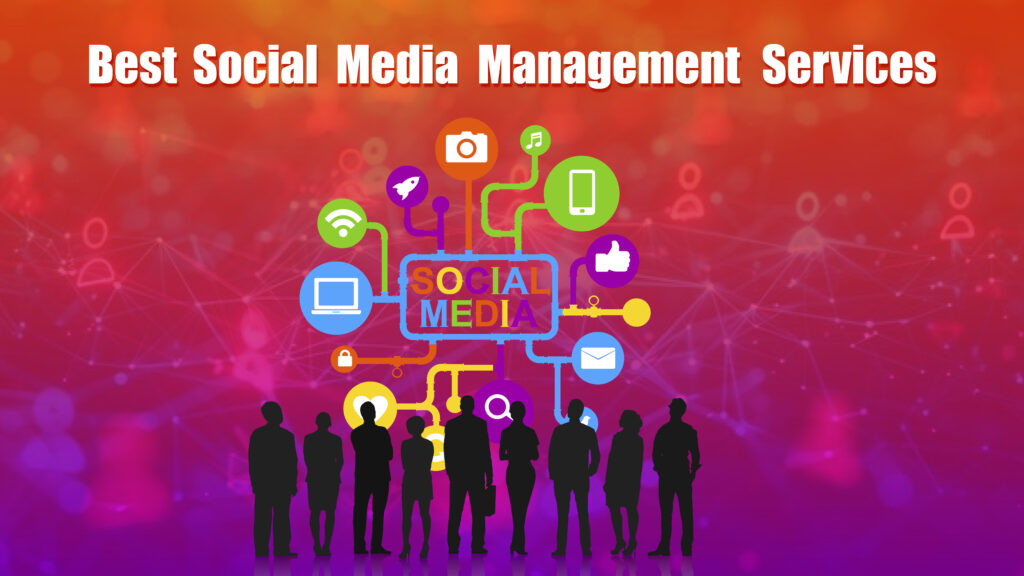Social media management is a vital aspect of modern marketing strategies. As businesses increasingly rely on social media platforms to connect with customers, managing these channels effectively becomes essential. The importance of social media management can be highlighted through several key benefits:
- Enhanced Brand Awareness: With billions of users active on social media, brands can reach a vast audience. Effective management helps increase visibility and recognition, making it easier for potential customers to discover your business.
- Improved Customer Engagement: Social media provides a platform for direct interaction with customers. By responding to comments, messages, and reviews, businesses can build relationships and foster loyalty.
- Informed Decision-Making: Social media management tools provide valuable insights into customer behavior and preferences. Analyzing this data helps businesses refine their strategies and make informed decisions.
- Crisis Management: In today’s digital age, issues can escalate quickly. Effective social media management allows brands to monitor conversations and respond promptly to mitigate potential crises.
- Increased Traffic and Lead Generation: A well-managed social media presence drives traffic to your website and can generate leads through targeted campaigns and promotions.
Criteria for Selecting Social Media Growth Services
When evaluating social media growth services, several key features should be considered to ensure you choose the right provider for your needs:
- Quality of Followers: It’s crucial to focus on gaining organic followers rather than just increasing numbers through fake accounts. Organic followers are more likely to engage with your content and convert into customers.
- Targeting Capabilities: The ability to reach specific demographics is essential for effective growth. Look for services that utilize data analytics to identify and engage users who align with your brand’s target audience.
- Engagement Strategies: Effective services employ various methods to boost engagement, such as creating high-quality content, running interactive posts, and maintaining a consistent posting schedule.
- Customer Support: Responsive customer support is vital for addressing any questions or issues that may arise during your campaign. A good service provider should offer multiple channels of communication.
- Analytics and Reporting: Comprehensive analytics tools are essential for measuring success. Look for services that provide detailed reports on follower growth, engagement rates, and overall performance metrics.
Target Audience
Different social media growth services cater to various target audiences, including:
- Agencies: Marketing agencies often require robust social media management tools that allow them to manage multiple clients efficiently. They benefit from services that offer comprehensive reporting features and team collaboration capabilities.
- Small Businesses: Small businesses typically look for cost-effective solutions that provide organic growth without requiring extensive resources. Services tailored for small businesses should prioritize user-friendly interfaces and straightforward pricing models.
- E-commerce Brands: E-commerce businesses need services that drive traffic directly to their online stores and convert followers into customers. Targeting capabilities and engagement strategies are critical for this audience.
- Influencers: Individual influencers require personalized growth strategies that help them build their brand presence while engaging with their audience authentically.
Understanding your target audience is crucial when selecting a social media growth service, as it ensures that the chosen provider aligns with your specific goals and needs.
Pricing Models
Pricing models vary significantly among social media growth services, so it’s essential to understand the different options available:
- Monthly Retainers: Many agencies charge a monthly fee for ongoing services that include content creation, account management, and analytics reporting. This model is suitable for businesses seeking long-term support.
- Pay-Per-Service: Some providers offer specific services at a set price per post or campaign. This model allows businesses to pay only for what they need without committing to ongoing contracts.
- Performance-Based Pricing: In this model, costs are tied directly to results achieved (e.g., follower growth or engagement rates). While this aligns incentives between you and the agency, it may be harder to predict costs upfront.
- Custom Packages: Many agencies offer custom pricing based on individual client needs or larger campaigns. This flexibility allows businesses to tailor their services according to specific requirements.
- Free Trials or Introductory Offers: Some providers may offer free trials or discounted introductory rates to attract new clients. This allows businesses to test the service before committing fully.
Key Metrics for Measuring Social Media Success
Engagement Rate
One of the most important metrics in social media management is engagement rate, which measures how actively users interact with your content. Engagement can include likes, shares, comments, retweets, or any other action taken by followers in response to your posts.
Importance: A high engagement rate indicates that your content resonates with your audience, leading to greater visibility through shares and interactions.
Calculation: To calculate engagement rate:
Engagement Rate = ( Total Engagements/Total Followers)×100
Monitoring engagement rates over time helps you understand what types of content perform best and how well you’re connecting with your audience.
Follower Growth Rate
Follower growth rate measures how quickly your follower count increases over time. This metric provides insight into the effectiveness of your growth strategies.
Importance: A steady increase in followers indicates successful marketing efforts and growing brand awareness.
Calculation:
Follower Growth Rate = (New Followers/Total Followers at Start ) × 100
Tracking follower growth helps you assess whether your strategies are attracting new audiences effectively.
Reach and Impressions
Reach refers to the total number of unique users who see your content, while impressions indicate how many times your content has been displayed (including multiple views by the same user).
Importance: Understanding reach helps you gauge how many people are exposed to your brand message while impressions provide insight into overall visibility.
Analysis: By comparing reach and impressions over time or across different campaigns, you can determine which types of content generate more visibility and engagement.
Conversion Rate
Conversion rate measures the percentage of users who take a desired action after engaging with your content (such as signing up for a newsletter or making a purchase).
Importance: High conversion rates indicate effective marketing strategies that successfully drive users from awareness to action.
Calculation:
Conversion Rate = (Conversions /Total Visitors) × 100
Analyzing conversion rates helps you refine your strategies by identifying which posts lead users toward taking action.
Audience Demographics
Understanding audience demographics such as age, gender, location, interests provides valuable insights into who engages with your brand on social media platforms.
Importance: Knowing your audience allows you to tailor content specifically designed for them, enhancing engagement rates.
Tools: Most social media platforms offer built-in analytics tools that provide demographic information about your followers.
Regularly reviewing audience demographics helps ensure that your marketing efforts align with the preferences of those most likely to engage with your brand.
Developing a Comprehensive Social Media Strategy
Setting Clear Goals
Before launching any social media campaign or initiative, it’s essential first to set clear goals aligned with overall business objectives.
Common goals may include:
- Increasing brand awareness
- Driving website traffic
- Generating leads
- Enhancing customer loyalty
By defining specific goals from the outset, you create a roadmap that guides all subsequent actions in your strategy.
Identifying Target Audience
Understanding who makes up your target audience is crucial in developing an effective strategy:
Research Demographics: Use analytics tools from existing platforms or conduct surveys to gather data about potential customers.
Create Buyer Personas: Develop detailed profiles representing segments of your target audience based on demographics, interests, pain points, and buying behaviors.
Identifying target audiences ensures that all content produced resonates well with those most likely interested in engaging with your brand.
Content Planning
A well-thought-out content plan is vital for maintaining consistency across all platforms:
- Content Calendar Creation: Develop a calendar outlining what type of content will be posted when across various channels.
- Content Types: Include a mix of formats such as images, videos, blog posts links, polls/quizzes etc., catering specifically towards user preferences identified earlier during research phases.
- Scheduling Tools Utilization: Use scheduling tools like Buffer or Hootsuite which allow pre-scheduling posts at optimal times based on when audiences are most active online maximizing visibility & engagement potential.
Engagement Tactics Implementation
Once content is live on platforms engagement tactics become necessary. Here are some ways brands can encourage interactions:
- Ask Questions in Posts/Stories: Prompt followers directly by asking questions related directly back towards them!
- Run Contests/Giveaways: Encourage participation by offering prizes; this not only boosts engagement but also attracts new followers!
- Utilize User-Generated Content: Encourage followers/customers sharing their experiences using products/services; feature them prominently within own feeds!
- Respond Promptly: Engage back! Responding quickly shows appreciation towards loyal fans while also encouraging further interaction!
By implementing these tactics effectively you’ll cultivate an engaged community around brand!
Monitoring Performance Metrics Regularly
To ensure success monitoring performance metrics regularly becomes essential! This involves:
Reviewing Key Metrics Identified Earlier (Engagement Rates/Follower Growth Rates/Conversion Rates).
Adjusting Strategies Based On Findings if certain types/formats aren’t performing well consider changing approach accordingly!
Conducting Regular Audits Of Existing Channels To Identify Areas Needing Improvement Or Optimization!
By continually assessing performance you’ll stay ahead trends while ensuring maximum effectiveness across all campaigns launched.
15 Best Social Media Management Services
Here is the list of the top 15 best social media management services in 2025:
- RankingGrow
- Instagrov
- DigitalGency
- Sprout Social
- Hootsuite
- Buffer
- SocialPilot
- Zoho Social
- Sendible
- Pallyy
- eClincher
- Tailwind
- PromoRepublic
- Vista Social
- MeetEdga
1. RankingGrow
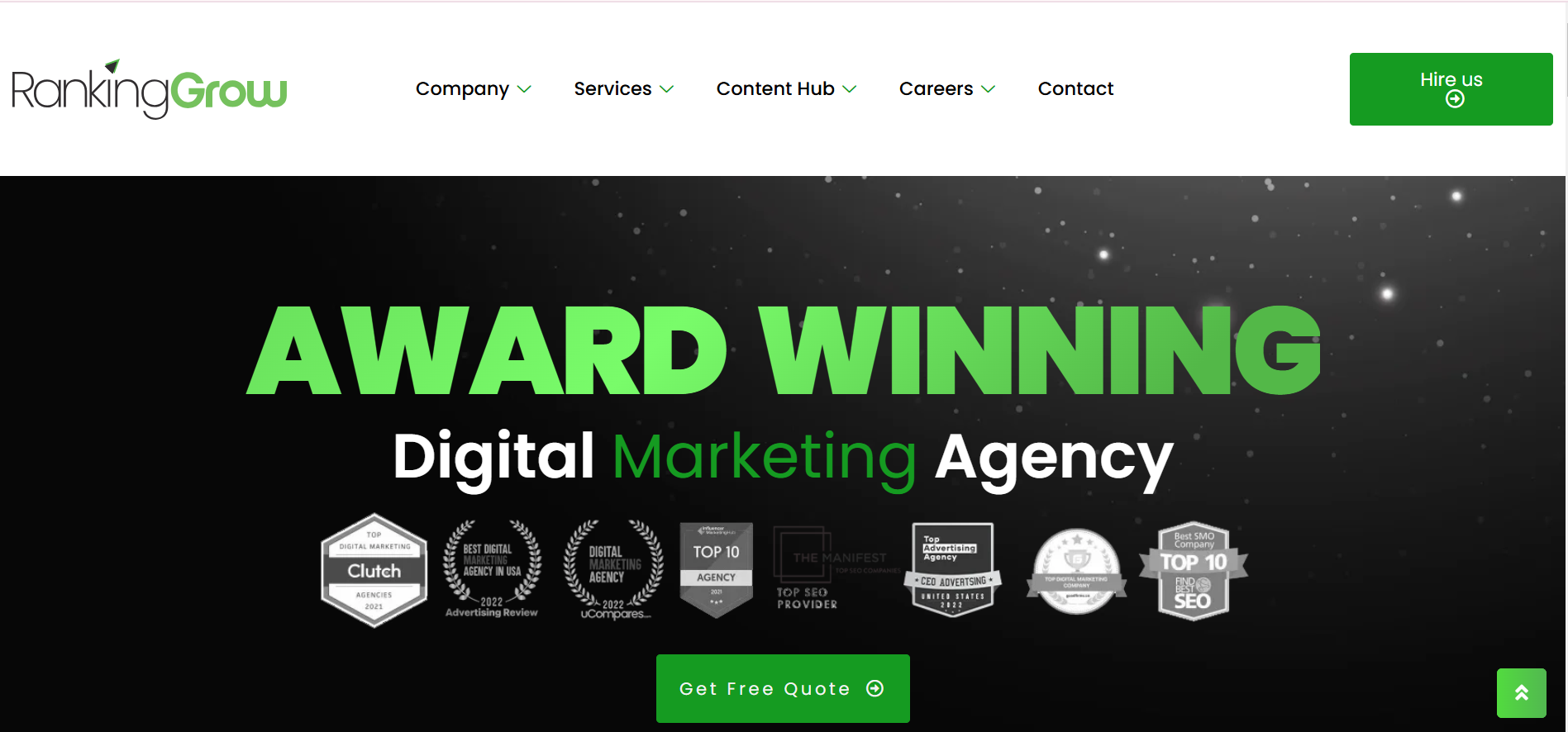
RankingGrow is a digital marketing agency that specializes in social media management and growth services. With a focus on enhancing online visibility, RankingGrow offers a variety of tools and strategies to help businesses grow their social media presence effectively. Their services are designed to attract genuine followers, increase engagement, and drive traffic to your website.
Key Features:
- Organic Growth Strategies: RankingGrow emphasizes organic growth methods that focus on attracting real followers who are genuinely interested in your brand. This approach helps build a loyal customer base over time.
- Content Creation: The agency provides high-quality content tailored to the needs of both the client and their target audience. This includes engaging posts, graphics, and videos that resonate with followers.
- Analytics and Reporting: RankingGrow offers detailed analytics that track performance metrics such as engagement rates, follower growth, and post reach. These insights help businesses refine their strategies for better results.
- Social Listening Tools: The platform includes tools for monitoring brand mentions and industry trends, allowing businesses to respond promptly to customer feedback and stay ahead of competitors.
2. Instagrov
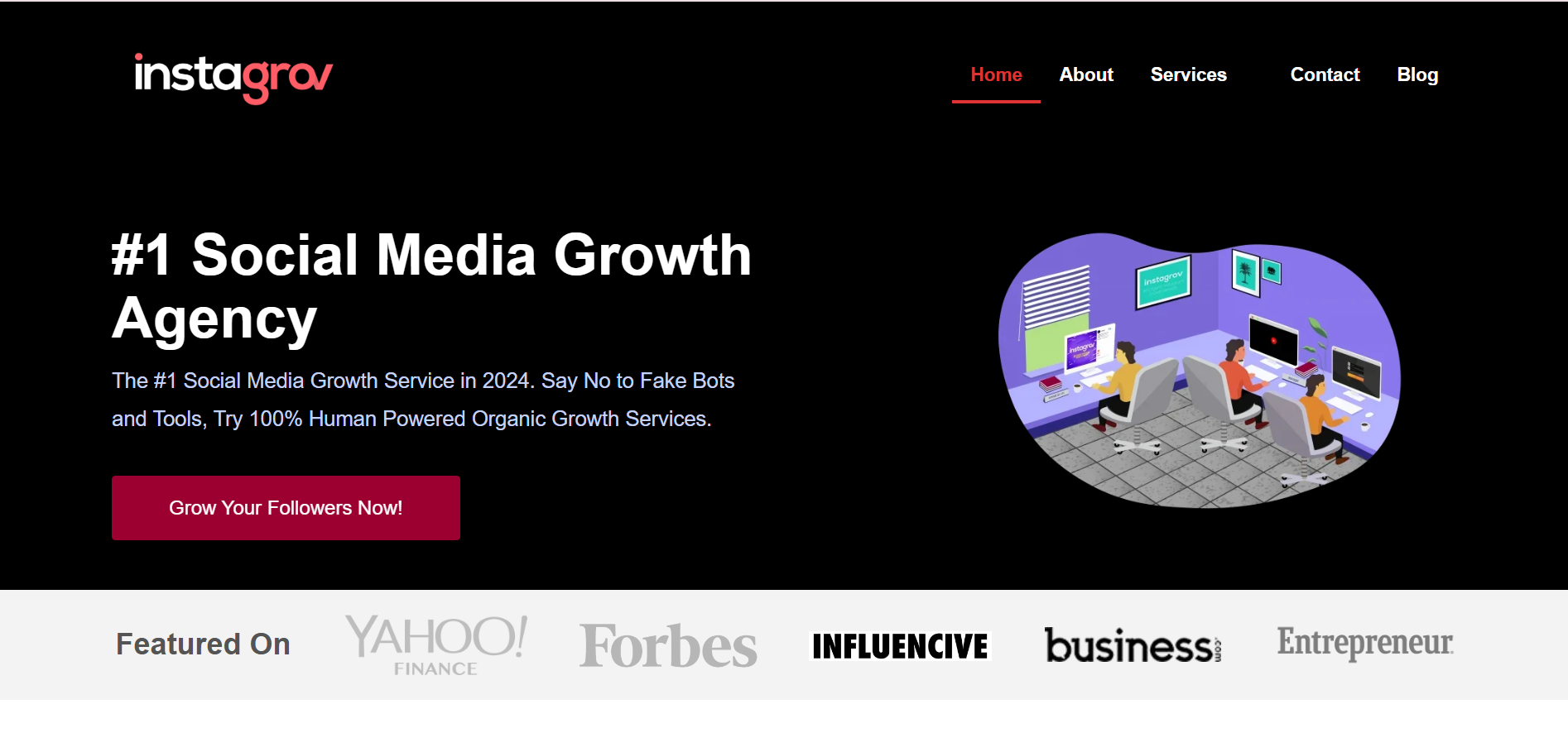
Instagrov is an agency that focuses on promoting brands on Instagram, the world’s most popular social network. Though mainly known for their service in Instagram, they also have other services that market a brand across the social media platforms.
Key Features:
- Social Media Management: Instagrov manages clients’ Instagram accounts by creating visually appealing posts, stories, and reels that capture the audience’s attention.
- Engagement Strategies: The agency employs various techniques to increase interaction with followers, including contests, polls, and user-generated content campaigns.
- Influencer Marketing: Instagrov connects brands with influencers to expand reach and enhance credibility through collaborative content.
Analytics Dashboard: Clients have access to an analytics dashboard that tracks engagement metrics and provides insights into audience behavior.
Pros and Cons
Pros:
- Creative approach to content creation leads to higher engagement rates.
- Strong focus on influencer partnerships enhances brand visibility.
- Comprehensive reporting helps clients understand their performance.
Cons:
- Limited features for platforms other than Instagram.
- Pricing may be higher for small businesses compared to basic management tools.
3. DigitalGency
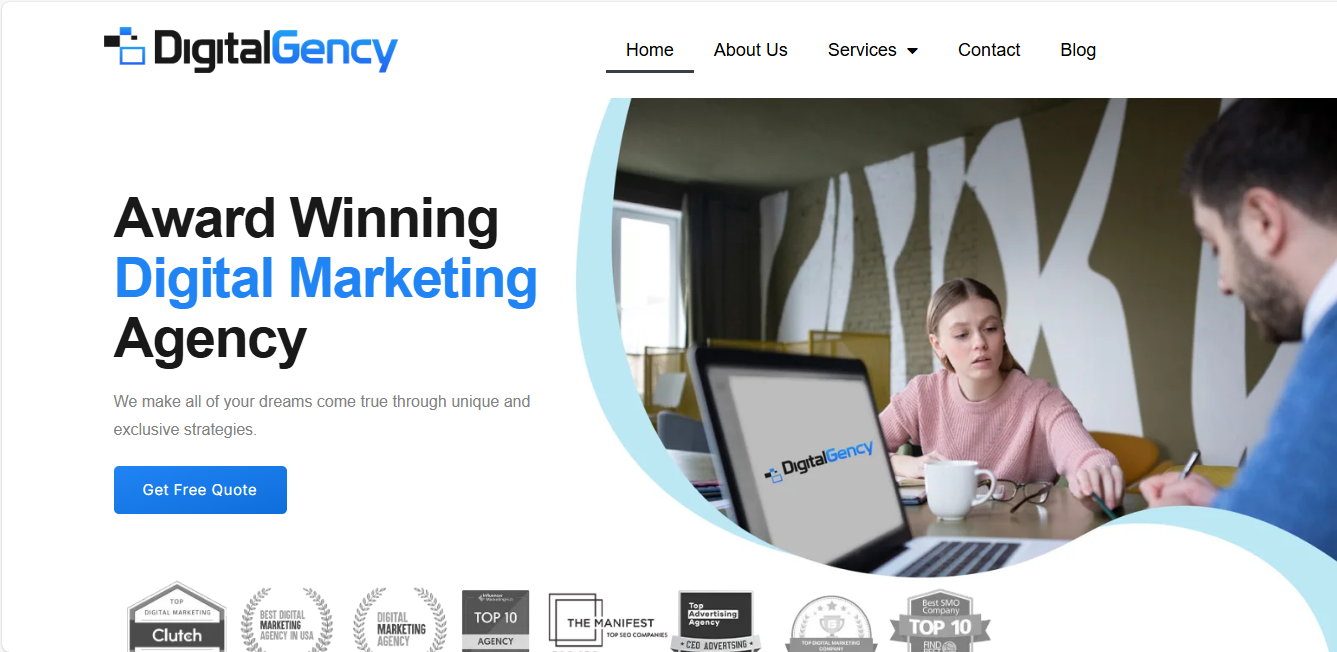
DigitalGency is a full-service digital marketing agency that provides a wide range of services tailored to meet businesses’ needs across various industries. Their mission is to deliver effective marketing solutions that drive growth and improve brand visibility.
Key Features:
- Social Media Growth Services: DigitalGency offers targeted social media growth services that connect businesses with high-authority websites relevant to their industry.
- SEO Services: In addition to social media management, DigitalGency provides comprehensive SEO strategies designed to improve website rankings and drive organic traffic.
- Content Creation: The agency develops engaging content that not only informs but also converts readers into customers. Their focus on quality ensures that all content resonates with the target audience.
- Client Management Tools: DigitalGency has robust tools for managing multiple client accounts efficiently, making it an excellent choice for agencies looking to streamline their operations.
Pros and Cons
Pros:
- Strong track record of success with various clients across different sectors.
- Comprehensive service offerings make it a one-stop solution for digital marketing needs.
- Excellent customer support ensures clients receive timely assistance.
Cons:
- Pricing may be higher than some competitors for certain services.
- Some users may find the platform overwhelming due to its extensive features.
4. Sprout Social
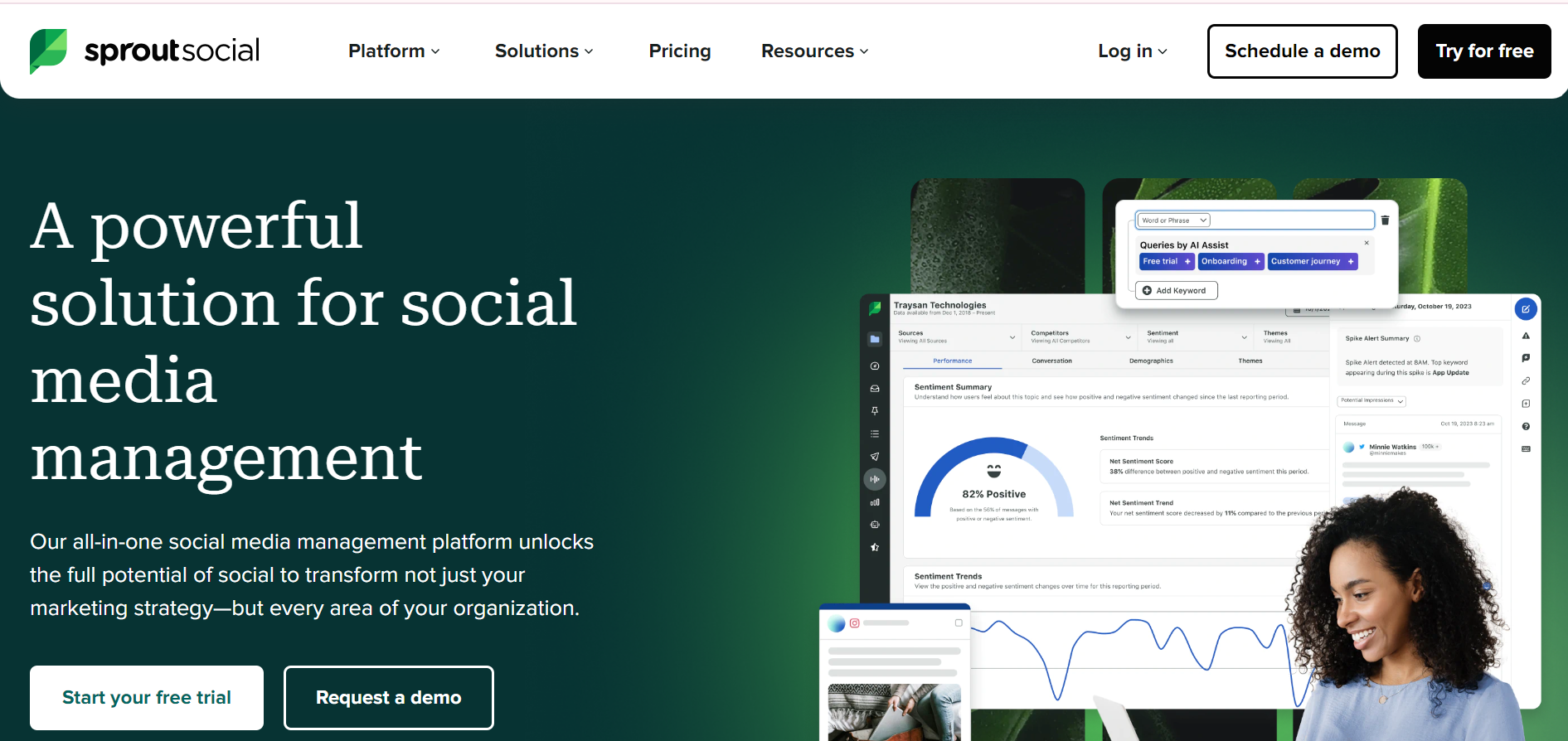
Sprout Social is a powerful social media management platform designed to help businesses manage their social media presence effectively. It provides a suite of tools for scheduling, publishing, analytics, and engagement across various platforms, including Facebook, Instagram, Twitter, LinkedIn, and Pinterest.
Key Features:
- Smart Inbox: This feature consolidates messages from all connected social accounts into one unified inbox, making it easier for teams to manage interactions.
- Publishing Tools: Users can schedule posts across multiple platforms, ensuring consistent content delivery.
- Analytics and Reporting: Sprout Social offers detailed analytics that track performance metrics such as engagement rates, follower growth, and post reach.
- Social Listening: This tool allows brands to monitor conversations about their business or industry, helping them respond to trends and customer feedback in real time.
Pros and Cons
Pros:
- Comprehensive analytics provide deep insights into social media performance.
- User-friendly interface makes it easy to navigate and manage multiple accounts.
- Excellent customer support with multiple communication channels.
Cons:
- Higher pricing compared to some competitors may not be suitable for small businesses.
- Some users report limitations in LinkedIn functionality.
5. Hootsuite
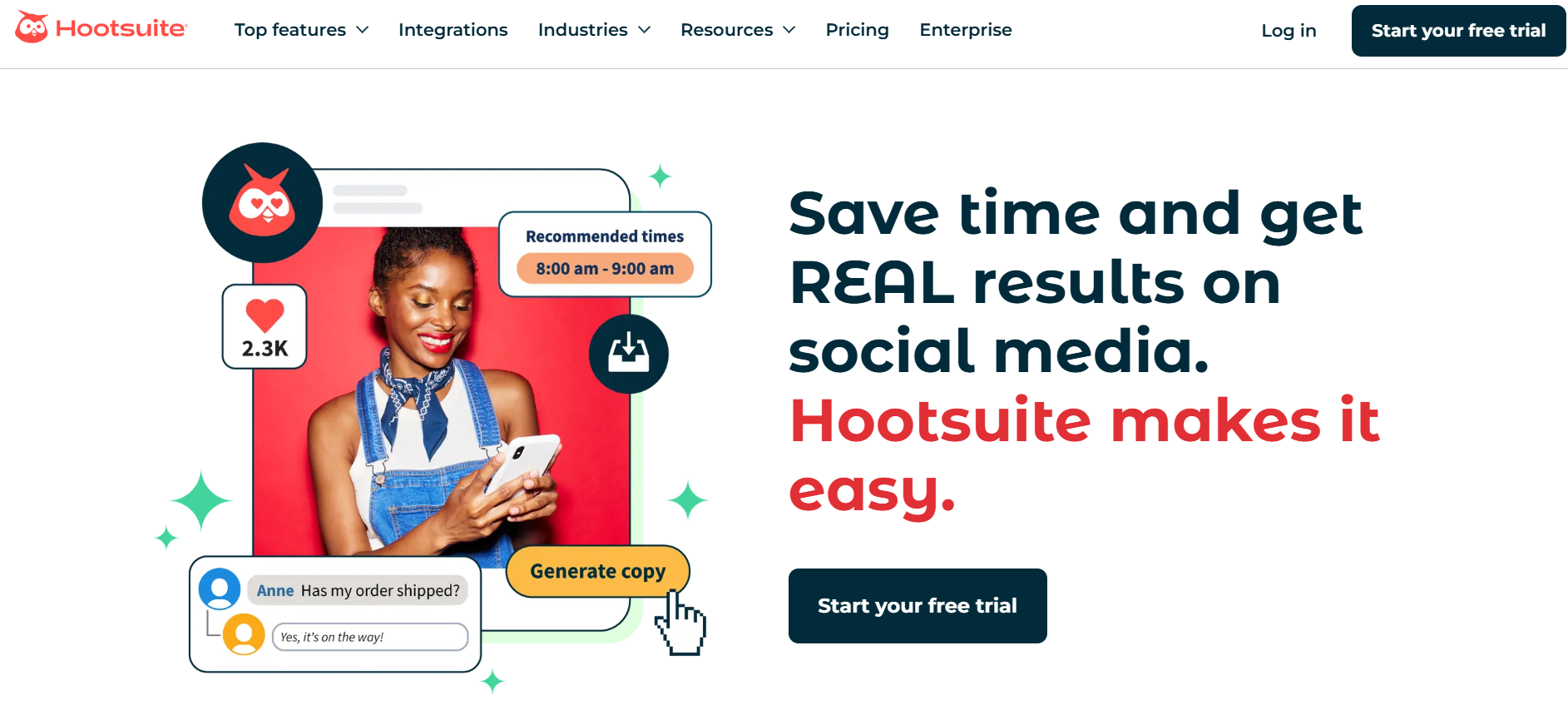
Hootsuite is one of the most recognized names in social media management. It allows users to manage multiple social media accounts from a single dashboard. Hootsuite supports a wide range of platforms, including Facebook, Twitter, Instagram, LinkedIn, and YouTube.
Key features of Hootsuite include:
Scheduling Posts: Users can schedule posts in advance across various platforms to maintain a consistent online presence.
- Analytics Dashboard: Hootsuite provides valuable insights into post performance and audience engagement metrics.
- Content Curation: The platform includes tools for discovering and sharing relevant content from around the web.
- Team Collaboration: Hootsuite allows multiple users to collaborate on social media campaigns while managing permissions effectively.
Pros and Cons
Pros:
- Supports a wide variety of social media platforms.
- Offers extensive integrations with other marketing tools.
- Strong analytics capabilities help track performance.
Cons:
- The interface can be overwhelming for new users due to its complexity.
- Pricing can be high for smaller teams or businesses.
6. Buffer

Buffer is a straightforward social media management tool that focuses on scheduling posts and analyzing performance. It is known for its simplicity and ease of use, making it an excellent choice for small businesses and individuals.
Key features of Buffer include:
- Post Scheduling: Users can easily schedule posts for multiple platforms at optimal times based on audience engagement data.
- Analytics: Buffer provides insights into how posts perform across different channels, helping users understand what works best.
- Browser Extension: The Buffer browser extension allows users to share content directly from their web browser quickly.
Pros and Cons
Pros:
- User-friendly interface makes it easy to navigate.
- Offers a free plan with basic features suitable for individuals or small businesses.
- Effective scheduling tools help maximize engagement.
Cons:
- Limited features compared to more comprehensive platforms like Sprout Social or Hootsuite.
- Advanced analytics require a paid plan.
7. SocialPilot
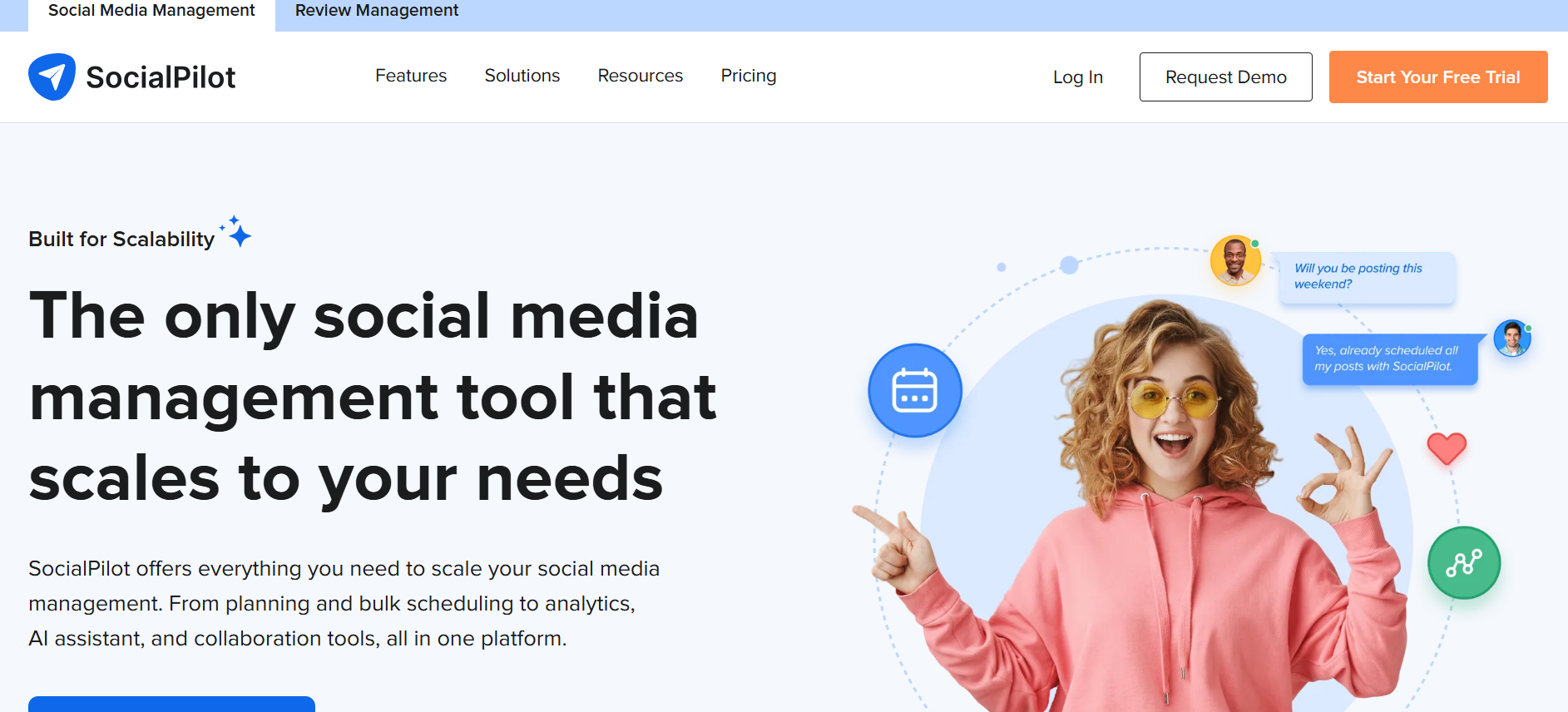
SocialPilot is an affordable social media management tool designed for agencies and businesses looking to streamline their social media efforts. It offers various features that simplify content scheduling, analytics, and team collaboration.
Key features of SocialPilot include:
- Bulk Scheduling: Users can upload multiple posts at once for scheduling across various platforms.
- Client Management Tools: Ideal for agencies, SocialPilot allows users to manage multiple client accounts efficiently.
- Content Curation: The platform helps users discover relevant content to share with their audience.
Pros and Cons
Pros:
- Cost-effective pricing plans make it accessible for small businesses and agencies.
- User-friendly interface simplifies the management process.
- Strong customer support with quick response times.
Cons:
- Some advanced features may not be as robust as those offered by competitors.
- Limited integrations with third-party applications compared to others in the market.
8. Zoho Social
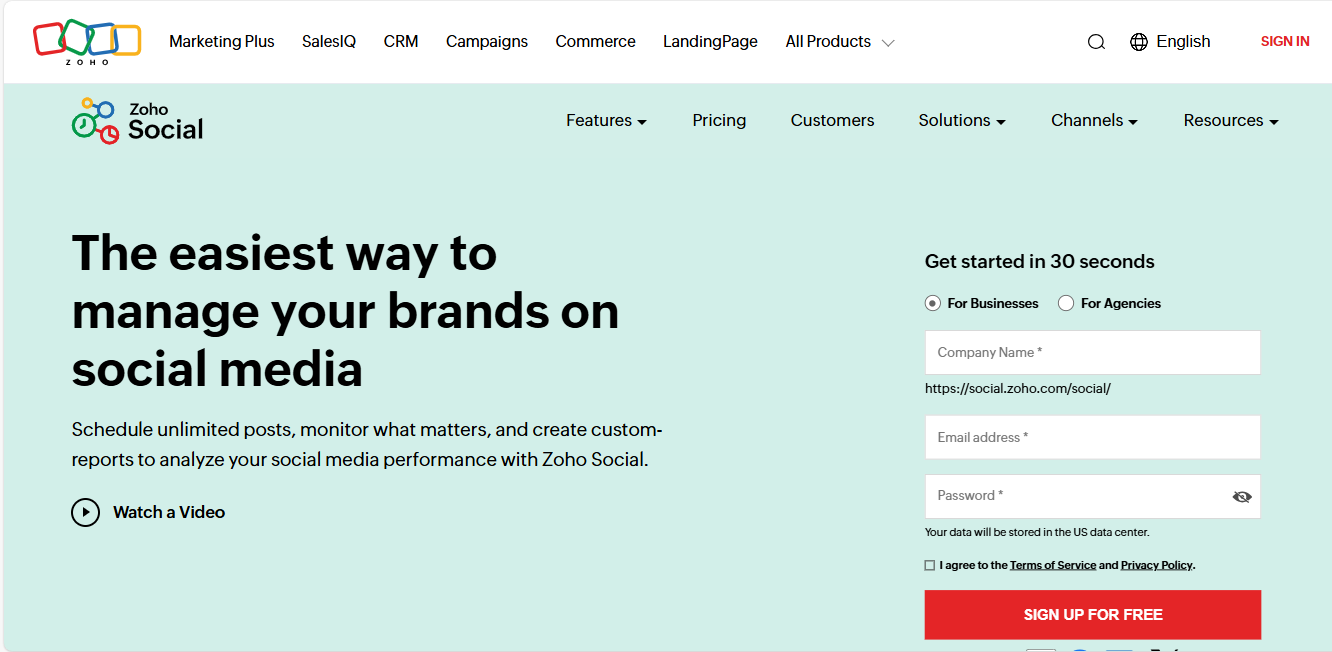
Zoho Social is part of the larger Zoho suite of business tools. It provides comprehensive social media management capabilities tailored for businesses looking to enhance their online presence.
Key features of Zoho Social include:
- SmartQ Scheduling: This feature automatically schedules posts at optimal times based on audience activity patterns.
- Collaboration Tools: Zoho Social allows teams to collaborate effectively by assigning tasks and sharing feedback within the platform.
- Analytics Reports: Users can generate detailed reports on engagement metrics, helping them track performance over time.
Pros and Cons
Pros:
- Integration with other Zoho products enhances productivity for existing users of the suite.
- Affordable pricing plans cater to various business needs.
- Intuitive interface makes it easy for teams to adopt.
Cons:
- Some users may find the learning curve steep if they are not familiar with Zoho products.
- Limited features compared to more established competitors like Hootsuite or Sprout Social.
9. Sendible
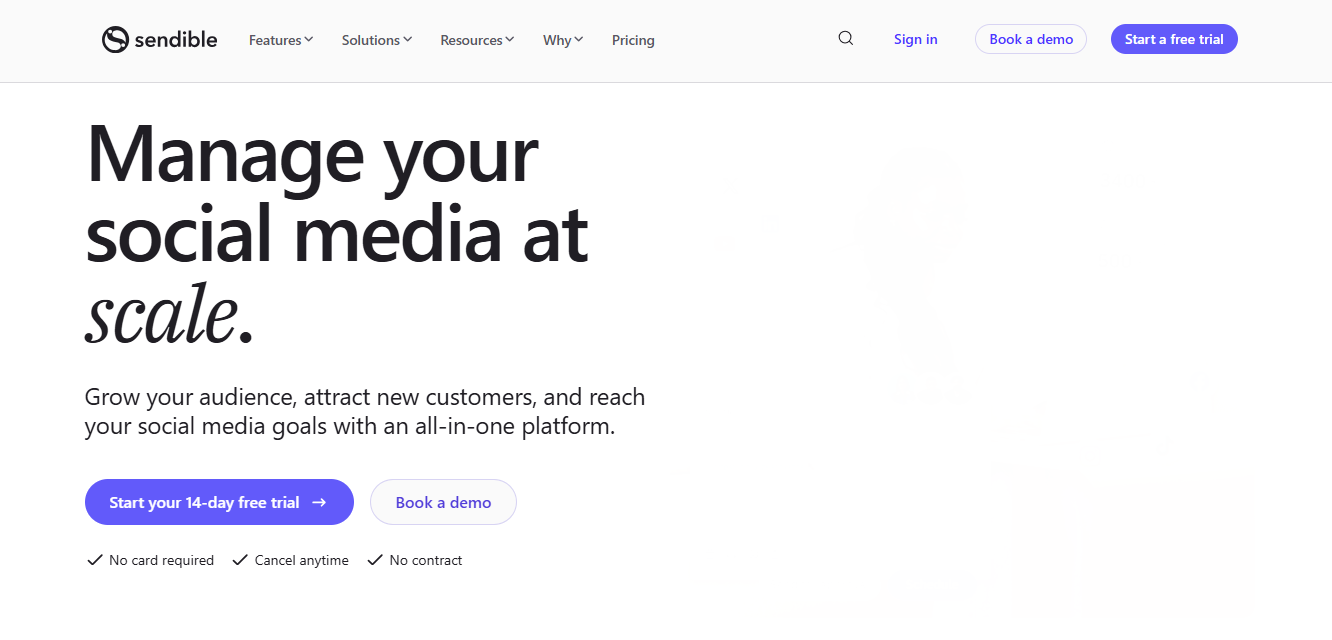
Sendible is a powerful social media management tool designed specifically for agencies. It offers a wide range of features that enable users to manage multiple clients efficiently.
Key features:
- Customizable Dashboards: Users can create personalized dashboards that display relevant metrics and updates for each client account.
- Content Suggestions: Sendible provides content suggestions based on trending topics within your industry, helping you stay relevant.
- Integration Options: The platform integrates with various third-party applications like Google Analytics, Canva, and WordPress.
Pros and Cons
Pros:
- Excellent for agencies managing multiple client accounts due to its robust features.
- Customizable reporting options allow agencies to present data effectively to clients.
Cons:
Pricing may be higher than some alternatives, especially for smaller teams or individual users.
10. Pallyy
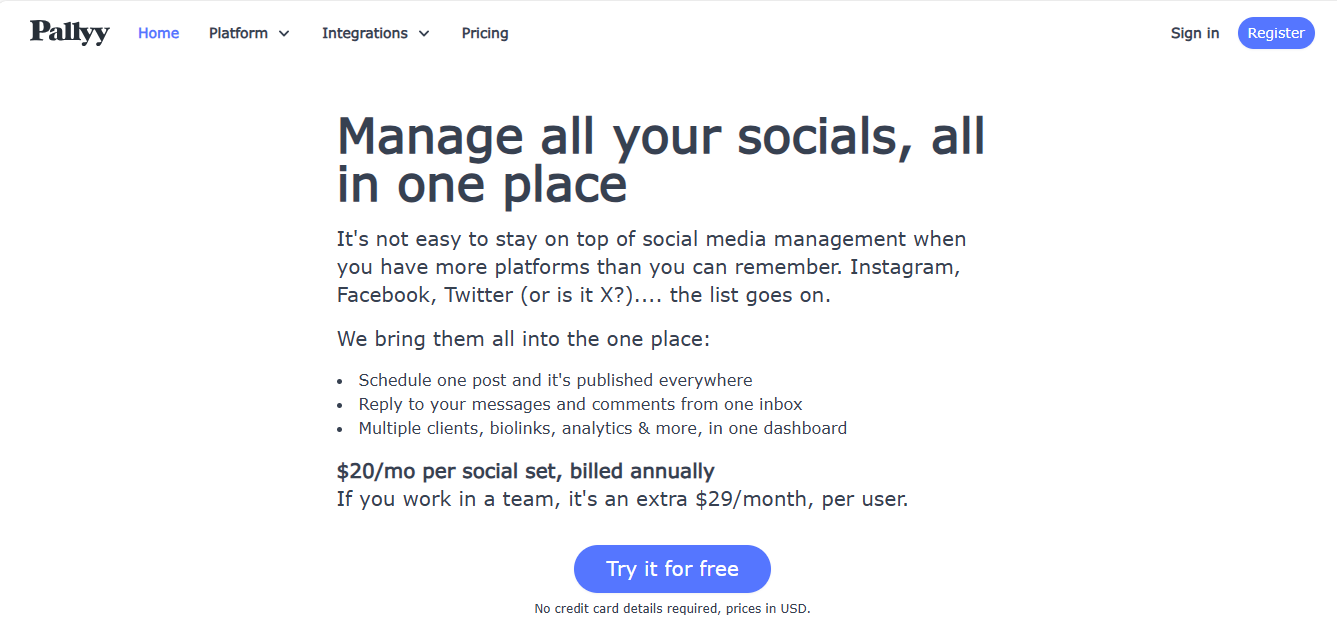
Pallyy is an all-in-one social media management tool designed primarily for Instagram but also supports other platforms like Facebook and Twitter.
Key features:
- Visual Content Calendar: Users can plan their posts visually using an intuitive drag-and-drop calendar interface that simplifies scheduling across platforms.
- Hashtag Manager: This tool helps users find relevant hashtags that increase post visibility while allowing them to save frequently used hashtags for future use.
- Analytics: Pallyy provides insights into post performance, follower growth, engagement rates, etc., helping brands refine their strategies over time.
Pros and Cons
Pros:
- User-friendly interface makes it easy even for beginners.
- Affordable pricing plans cater well to small businesses or individuals looking for effective solutions without breaking the bank.
Cons:
Limited functionality compared to larger platforms like Hootsuite or Sprout Social when it comes down more advanced reporting features.
11. eClincher
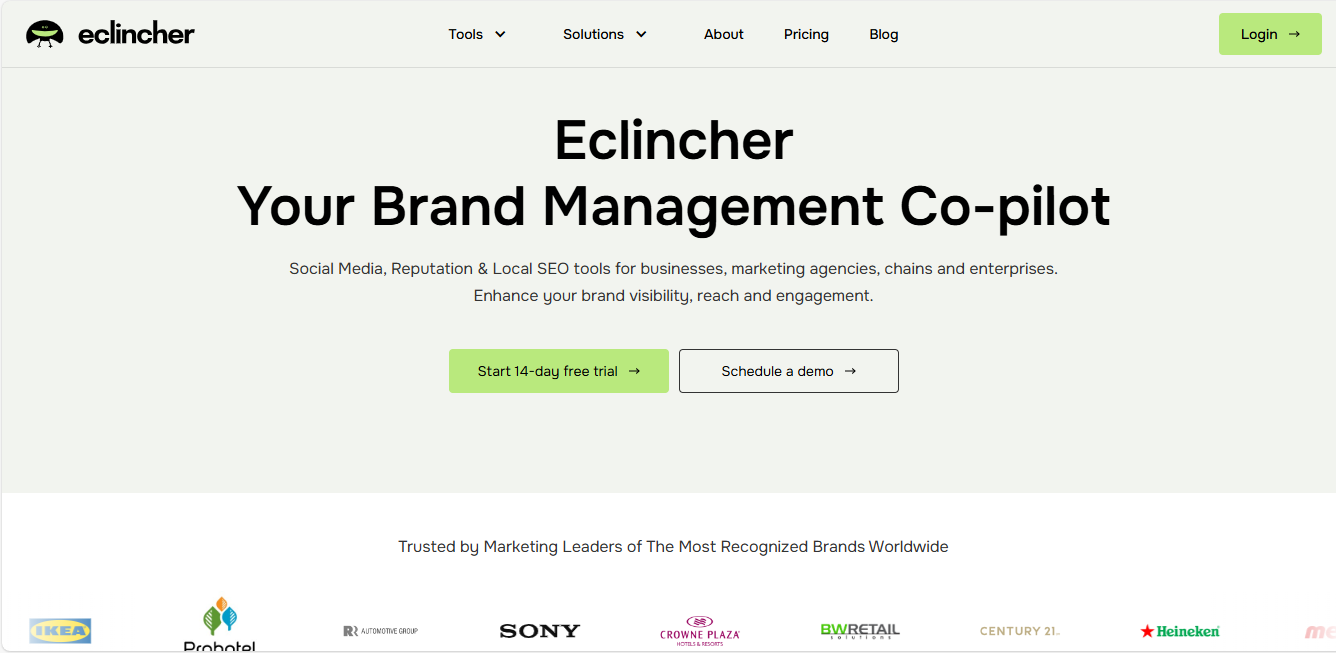
eClincher is another comprehensive social media management platform that offers powerful tools designed specifically for marketers looking at efficiency while managing several accounts simultaneously.
Key features:
- Unified Inbox: This feature aggregates messages from all connected accounts into one place so that users can respond quickly without switching between different profiles constantly.
- Auto Post RSS Feeds: Users can automatically share content from their favorite blogs or websites by connecting RSS feeds directly into eClincher’s system—saving time while keeping content fresh!
- Visual Content Calendar: Similar functionality as Pallyy’s calendar where users can visualize scheduled posts across all channels at once!
Pros and Cons
Pros:
- Excellent customer support ensures any issues are resolved promptly!
- Offers a wide range of integrations with other popular tools such as Canva & Google Analytics!
Cons:
Slightly higher pricing compared with some alternatives available in the market today.
12. Tailwind
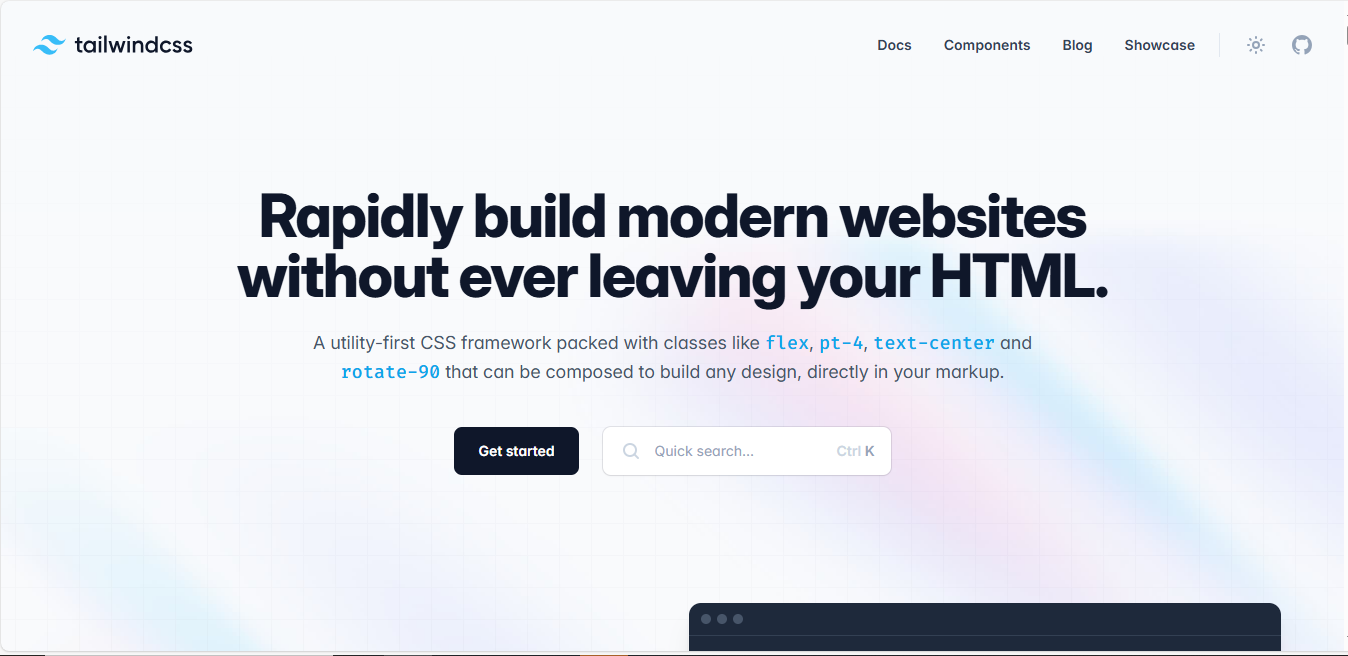
Tailwind specializes in visual platforms like Pinterest & Instagram making it an excellent choice if your brand heavily relies on these channels!
Key features:
- Smart Schedule: Automatically suggests optimal posting times based on audience activity patterns!
- Tailwind Tribes: Allows users within similar niches/industries connect & share each other’s content boosting visibility across networks collectively!
- Pinning Strategies: Tailwind provides suggestions on how often & when pins should be posted based on historical data collected over time!
Pros and Cons
Pros:
- Great analytics dashboard showing how well pins perform over time!
- Easy-to-use interface tailored specifically toward visual marketers!
Cons:
Limited functionality outside Pinterest & Instagram less useful if you’re looking at broader multi-platform strategies.
13. PromoRepublic
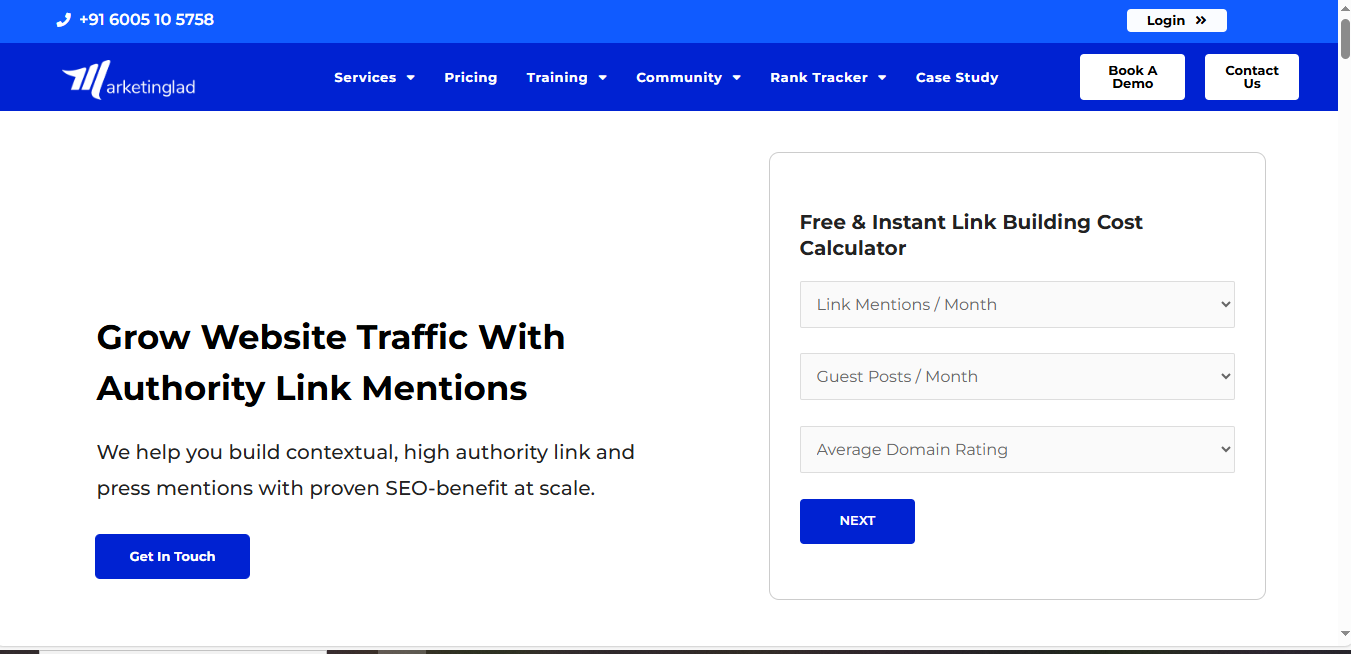
PromoRepublic focuses on creating engaging content tailored specifically towards local businesses & franchises looking at enhancing their online presence through effective marketing strategies.
Key features:
- Content Library: Offers thousands of customizable templates ready-to-use—perfectly suited for small business owners who may not have design experience!
- Local Marketing Tools: Helps brands target specific geographic areas effectively by providing localized content suggestions!
- Collaboration Tools: Allows team members collaborate seamlessly when creating campaigns together.
Pros and Cons
Pros:
- Extensive library filled with ready-to-use graphics/templates saves time!
- Localized marketing strategies help connect better with nearby audiences!
Cons:
May lack advanced analytics found in larger platforms like Sprout Social or Hootsuite.
14. Vista Social
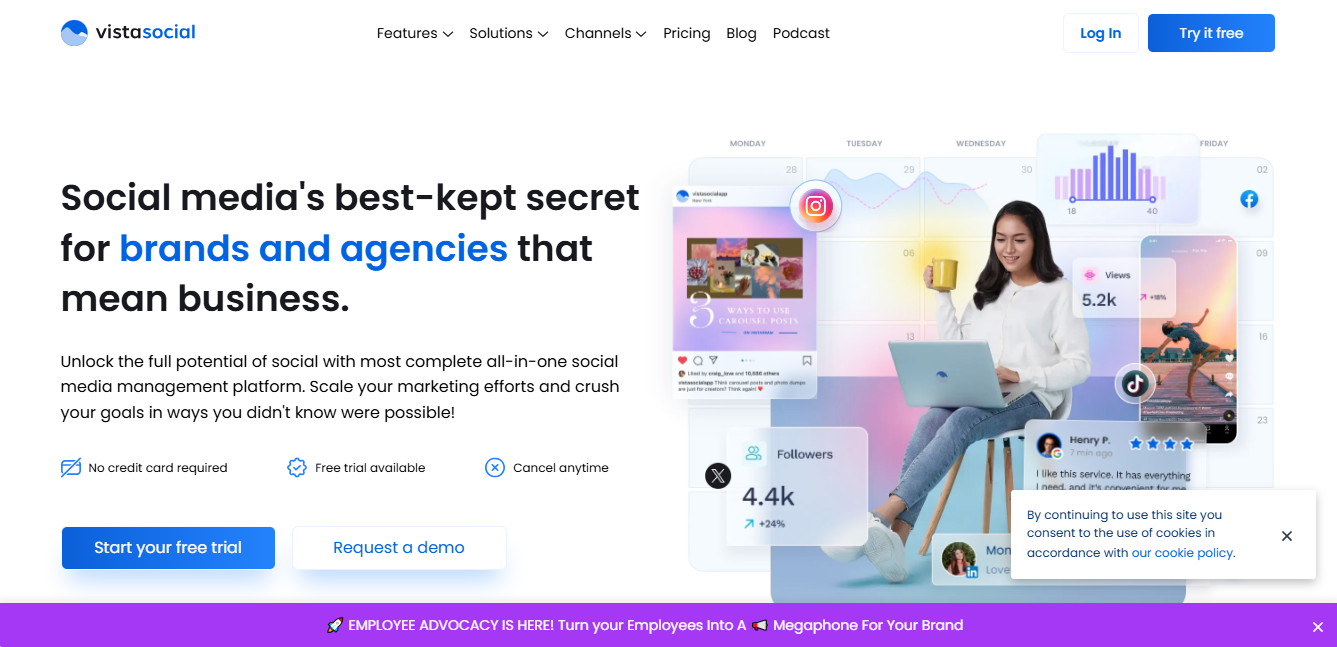
Vista Social is another emerging player offering comprehensive solutions aimed primarily at small-medium sized enterprises (SMEs)!
Key features:
- Unified Inbox: Similar functionality where all messages from different channels come together allowing easier management!
- Social Listening Capabilities: Monitor mentions & keywords related directly back towards brand ensuring timely responses when necessary!
- Multi-user Access Control: Great feature allowing teams collaborate effectively while managing permissions accordingly.
Pros and Cons
Pros:
- Affordable pricing makes it accessible even if budget constraints exist!
- User-friendly design ensures quick onboarding regardless skill level!
Cons:
Some advanced features may still need improvement compared competitors.
15. MeetEdgar
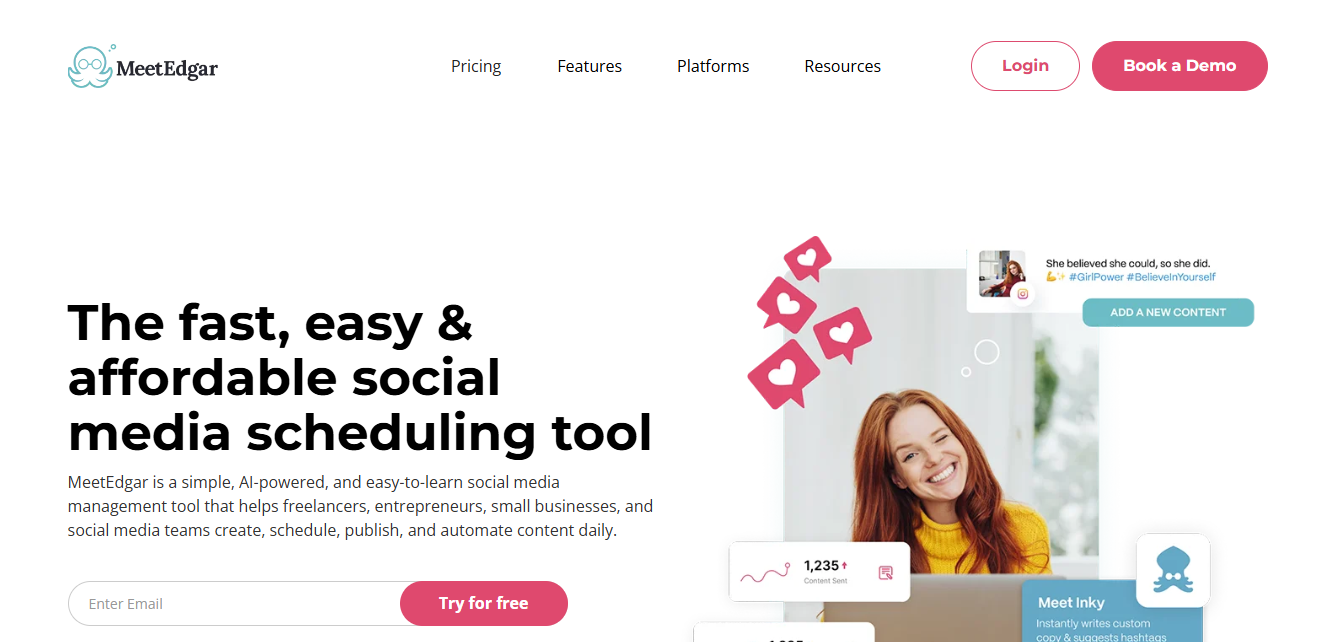
MeetEdgar focuses heavily on automating repetitive tasks associated with running social media accounts allowing brands focus more strategically instead!
Key features:
- Content Recycling Feature: Automatically re-shares evergreen content ensuring maximum exposure over time without needing constant manual intervention!
- Category-Based Scheduling: Users can categorize posts ensuring diverse types get shared regularly preventing burnout from similar messaging repeatedly appearing too often.
Pros And Cons
Pros:
- Excellent automation capabilities save significant time/effort!
- Simple setup process makes getting started easy even if new user unfamiliarity exists!
Cons:
Limited integrations compared some larger players which might restrict flexibility depending on needs arise later down line
Conclusion
Effective social media management is crucial for businesses seeking to enhance their online presence and engage with customers. By leveraging the right tools and strategies, brands can increase awareness, drive traffic, and foster customer loyalty. With numerous services available, selecting the best fit can significantly impact your marketing efforts.
Frequently Asked Questions (FAQs)
What is social media management?
Social media management involves creating, scheduling, and analyzing content on social platforms to engage audiences and build brand awareness.
Why is social media management important for businesses?
It helps businesses connect with customers, improve brand visibility, manage reputation, and drive traffic to their websites, ultimately leading to increased sales.
How do I choose the best social media management service?
Look for services that offer organic growth strategies, robust analytics, strong customer support, and features tailored to your specific audience and business goals.
